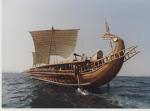
| Next | Previous | Index | Tellout Home |
68. Roman Ship Captains
Revelation 18.17b-20
"Every sea captain, all travelers by ship, sailors, all who earn their living from the sea, will stand far off. When they see the smoke of Rome's burning, they will exclaim, 'Was there ever a city like this great city?' They will throw dust on their heads, and with weeping and mourning, cry out, 'Woe! Woe to you, great city, where all who had sea ships became rich through her wealth! In one hour, she is in ruins! Rejoice over her, you heavens! Rejoice, God's people! Rejoice, apostles, and prophets! God has judged her with the judgment she imposed on you." (Revelation 18.17b-20) ✞
Alexandrian Sea Ships
 The kings, the merchants, and now every Roman Ship Captain utters their lament over Rome. John of Patmos is no doubt recalling a similar picture of Tyre's fall in Ezekiel 27.28-30, where Ezekiel explains, "The shorelands will quake when your sailors cry out. All who handle the oars will abandon their ships; the mariners and sailors will stand on the shore. They will raise their voice and cry bitterly over you; they will sprinkle dust on their heads and roll in ashes." ✞
The kings, the merchants, and now every Roman Ship Captain utters their lament over Rome. John of Patmos is no doubt recalling a similar picture of Tyre's fall in Ezekiel 27.28-30, where Ezekiel explains, "The shorelands will quake when your sailors cry out. All who handle the oars will abandon their ships; the mariners and sailors will stand on the shore. They will raise their voice and cry bitterly over you; they will sprinkle dust on their heads and roll in ashes." ✞
Ostia
 Rome was not situated on the coast but lay twenty miles inland on a northeast inlet. Those in Ostia would have been able to see Rome's burning. Its port, Ostia, was at the mouth of Rome's principal river, the Tiber. The world's merchandise flowed from ocean-going ships into Ostia and then on to Rome. Some beautiful floor mosaics still exist there, advertising merchants' services. The ship's captains and sailors lamented that the trade, which brought so much wealth to them, was gone. ✞
Rome was not situated on the coast but lay twenty miles inland on a northeast inlet. Those in Ostia would have been able to see Rome's burning. Its port, Ostia, was at the mouth of Rome's principal river, the Tiber. The world's merchandise flowed from ocean-going ships into Ostia and then on to Rome. Some beautiful floor mosaics still exist there, advertising merchants' services. The ship's captains and sailors lamented that the trade, which brought so much wealth to them, was gone. ✞
Merchants' Lament
 Rome's ancient port hears the Ostia merchants' lament with weeping and mourning. In every case, the merchants' outcry was not for the city of Rome but themselves. One of the laws of life is that if people place all their trust in material things, they will likely miss out on love and friendship, which are most important. The joyful sound of those who are glad to see God's vengeance on his enemies and persecutors comes from the lamenting. We find this note more than once in scripture. In Deuteronomy 32.43, we read, "Rejoice, you nations, with his people, for he will avenge his servants' blood, he will take vengeance on his enemies and make atonement for his land and people." "Rejoice, you nations, with his people" can be translated as "make his people rejoice, you nations." ✞
Rome's ancient port hears the Ostia merchants' lament with weeping and mourning. In every case, the merchants' outcry was not for the city of Rome but themselves. One of the laws of life is that if people place all their trust in material things, they will likely miss out on love and friendship, which are most important. The joyful sound of those who are glad to see God's vengeance on his enemies and persecutors comes from the lamenting. We find this note more than once in scripture. In Deuteronomy 32.43, we read, "Rejoice, you nations, with his people, for he will avenge his servants' blood, he will take vengeance on his enemies and make atonement for his land and people." "Rejoice, you nations, with his people" can be translated as "make his people rejoice, you nations." ✞
Dead Sea Scrolls
Interestingly, the Dead Sea Scrolls found in a desert cave add a footnote to this verse, "and let all the angels worship him." Jeremiah 51.48 predicts ancient Babylon's doom, "'Then heaven, earth and all that is in them will joyfully shout over Babylon, for from the north destroyers will attack her,' declares the Lord." ✞
Making Enemies Friends
 Making enemies friends is a possibility. Abraham Lincoln's friends told him that he was too lenient with his opponents and must destroy his enemies. He answered, "Do I not destroy my enemies when I make them my friends?" The people here in Revelation are not praying for those who despitefully use them. But two things have to be remembered. Whatever we may feel about this voice of vengeance, it is nonetheless the voice of faith. These men and women have utter confidence that no one on God's side can lose in the end. There is no personal bitterness. People are not our enemies so much as God's. At the same time, this is not the most excellent way. Jesus encourages us to make our enemies into our friends. The best Christian attitude is to seek to destroy enmity, not by force, but by the power of the love of Calgary's cross. ✞
Making enemies friends is a possibility. Abraham Lincoln's friends told him that he was too lenient with his opponents and must destroy his enemies. He answered, "Do I not destroy my enemies when I make them my friends?" The people here in Revelation are not praying for those who despitefully use them. But two things have to be remembered. Whatever we may feel about this voice of vengeance, it is nonetheless the voice of faith. These men and women have utter confidence that no one on God's side can lose in the end. There is no personal bitterness. People are not our enemies so much as God's. At the same time, this is not the most excellent way. Jesus encourages us to make our enemies into our friends. The best Christian attitude is to seek to destroy enmity, not by force, but by the power of the love of Calgary's cross. ✞
"Roman Ship Captains"
by Ron Meacock © 2021
| ^Top Page | Next | Previous |